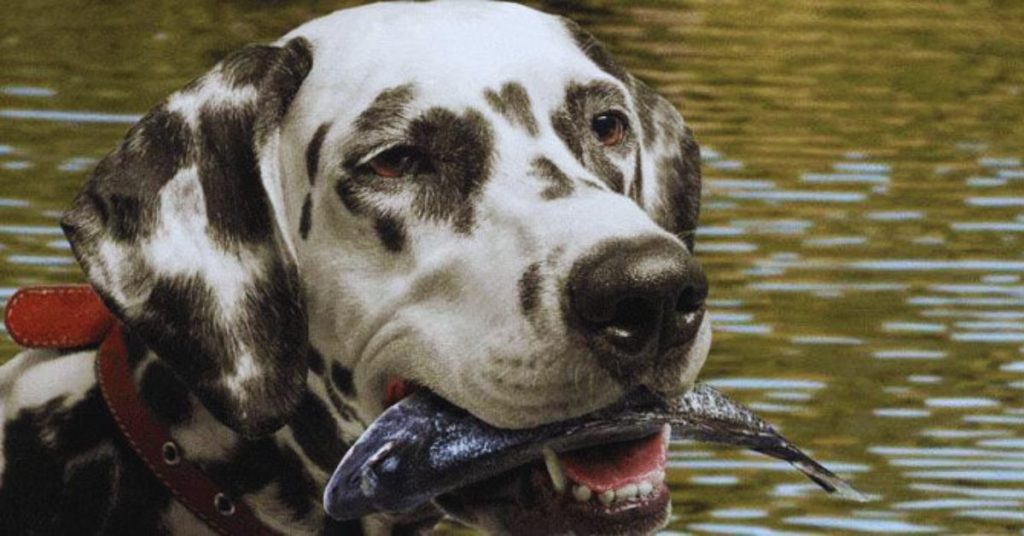Because tuna is a saltwater fish, there are reasons to exercise caution when eating it. Since tuna is unlikely to create health problems, dogs can eat it in moderation and infrequently. Since each dog is unique, it’s crucial to start with very little amounts to observe how your dog responds.
When it comes to whether, can dogs eat tuna? opinions vary. Even though it is a safe element in many balanced dog meals, there is mixed advice regarding providing extra tuna as a treat. While some experts strongly suggest this seafood, others caution against including more tuna in your dog’s diet.
Is Tuna Good for Dogs?
Tuna is a vital food for a dog’s overall health. It is rich in minerals, protein, and vitamins. It also includes omega-3 fatty acids, which benefit the cardiovascular system, skin, and coat. Certain dog meals may contain tuna as a beneficial nutrient source.
There is no need to give more tuna as a gift because it has no nutritional benefit. If you offer your dog a comprehensive and balanced dog food diet, it should receive all the nutrients it requires.
Can Dogs Eat Raw Tuna Fish?

Fresh tuna has significantly higher mercury levels than other fish species like salmon and tilapia. Extreme mercury consumption can lead to mercury poisoning, which can cause serious or even deadly health issues.
Because of industrial processes like coal-fired electricity generation, mercury enters our lakes, rivers, and oceans. The mercury builds up in fish. The American bulldog breed and mercury concentration in a fish’s tissues increases with size and lifespan. Due to their size and longevity, tuna have a high mercury content.
Consumer Reports, a nonprofit, advised people to restrict their tuna intake according to weight. It’s best to avoid giving your dog any canned or raw tuna because dogs are smaller than people, and there are no guidelines for how much a puppy may safely consume.
How Much Tuna Can I Give My Dog?
To find out how much tuna you may safely give your dog each day or each week:
- Speak with your veterinarian.
- Remember that there may be no answer to the query, “How much tuna for my pup and do dogs eat tuna?”
- Don’t overindulge in portions; always use moderation like any other food category.
Why is Tuna Sometimes Considered Harmful to Dogs?
Not all pet experts believe that tuna should be in the dog’s food bowl, even though it is a great source of nutrition for our four-legged friends. The following are some of the most frequent explanations for why the response to the query, “Is tuna good for dogs?” is occasionally “no”:
Can Puppies Have Tuna?
Puppies might not be able to taste tuna for some time. They have a lot of maturing to do, and puppy food formulations are specifically made to provide them with all the nutrients they require to do it healthily. Additionally, because of their small size, it can be more difficult to ensure you give them the appropriate portion. For now, keeping tuna in the cabinet regarding puppies is safest.
Can Dogs Have Tuna and Can Dogs Eat Canned Tuna?
The answer is yes, as long as you provide canned tuna to your dog sparingly, dogs and canned tuna, and in moderation. Select the fresh water-packed variety rather than the salty or oil-packed one. Additionally, read the label to ensure no additional salt is added to the canned tuna.
Can Dogs Have Raw Tuna?
No, raw tuna should not be given to dogs. Any raw fish may have bacteria or parasites that might seriously harm your dog. Raw tuba for dogs also includes an enzyme called thiaminase, which prevents the absorption of vitamin B1. This problematic enzyme is eliminated when the fish is cooked, which is another reason why tuna should be cooked all the way through before being placed in your dog’s food dish.
Can Dogs Eat Canned Tuna in Water?

Although tuna has many nutritional advantages, it should only be consumed infrequently due to the possibility of mercury poisoning. Don’t serve tuna daily; keep servings small (approximately 1 tablespoon). Introduce a tiny amount at first, then see how your dog responds. Any allergies or other health problems should be apparent within 24 hours.
Over a week, large breed dogs can consume one can of tuna, but only some weeks. Over a week, small breeds can comfortably eat roughly half a can.
Your veterinarian will advise you on how much tuna is appropriate for your pet based on size, weight, and medical requirements.
Benefits of Tuna for Dogs
Tuna, in small quantities, is great for dogs since it’s rich in:
- Potassium
- Protein
- Vitamin B3
- Vitamin B6
- Vitamin B12
- Magnesium
- Selenium
- Omega-3 fatty acids
Risks of Tuna for Dogs
Unfortunately, due to its high position in the food chain, tuna contains a lot of mercury, which can poison your dog if they consume a lot. Mercury poisoning symptoms include:
- Tremors
- Nervousness or anxiety
- Loss of feeling in paws
- Vision problems
- Bloody or watery diarrhea
- Hair loss
- Loss of coordination
- Vomiting blood
- Kidney damage (abdominal swelling, inability to urinate)
Is All Tuna Safe For Dogs?
Different species of tuna generally contain different levels of mercury.
- If you plan to feed your dog canned light tuna regularly, it is the safest option because it has the lowest mercury levels (though you should still avoid giving your dog more than once or twice a week).
- With somewhat higher mercury levels than canned light tuna, yellowfin, and white albacore tuna, whether frozen, fresh, or canned, it would be a good occasional snack for most dogs (but puppies or dogs who are pregnant or nursing shouldn’t eat it).
- Dogs should avoid eating bigeye tuna, the most popular sushi and sashimi type with the highest mercury content.
Can Dogs Die From Eating Tuna?

Although it is improbable, dogs could die from eating tuna, particularly if they eat a lot of tuna tainted with high levels of mercury. If treatment is not received, renal failure and death may result from mercury poisoning, which is a dangerous and potentially fatal illness.
It’s crucial to remember that not all tuna have high mercury levels, and the hazards might change based on the kind and quantity of tuna eaten. Small amounts of cooked tuna are usually safe to give your dog as a treat once in a while, but it shouldn’t be a consistent component of their diet. Dogs that are small, young, or have any health issues should never be given tuna.
Can Dogs Eat Canned Tuna Fish and Which Types of Fish Can Dogs Eat?
Since smaller, wild-caught fish are less likely to have high mercury levels or substantial parasite burdens, they are generally safe choices. The following are on the list:
- Salmon
- Herring
- Cod
- Flounder
- Catfish
- Whitefish
- Whiting
FAQs
What Occurs if a Dog Eats a Lot of Tuna?
A dog may get mercury poisoning if they consume a lot of tuna. Dogs with mercury toxicity may exhibit the following symptoms:
- Tremors
- Loss of feeling in paws
- Vision problems
- Nervousness or anxiety
- Bloody or watery diarrhea
- Loss of coordination
- Hair loss
- Kidney damage (abdominal swelling, inability to urinate)
- Vomiting blood
Can a Diet of Tuna Harm Dogs?
Dogs can sometimes safely eat tuna, but a diet high in tuna can guide to mercury toxicity. Dogs are healthier when they eat smaller, lower-food-chain fish because they contain less mercury than tuna.
Can Dogs Eat Tuna Fish in Water?
Canned tuna in water is healthy for dogs as long as they are fed in small amounts. A large dog, for instance, might eat up to one can of tuna in a week, but it should only eat part of the can every day.
What types of Tuna are Safe for Dogs to Consume?
Light tuna in a can is the safest kind for dogs. Small amounts of cooked tuna are acceptable for dogs if it isn’t fried or combined with potentially toxic substances like mayonnaise or onions.
